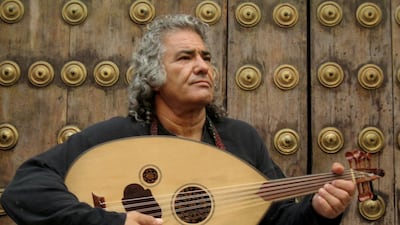Hani Naser has a fascinating theory about why music moves us so deeply. It dates back to the beginning of time.
“Think about it, the universe started with the ‘big bang’, which caused a vibration,” he says. “That vibration of sound, it has a rhythm. If it goes out of rhythm there’s dissonance all over the universe, it will fall apart. Rhythm is the essence, the heart, the soul, the spirit of everything.”
Music certainly resonates powerfully in Naser. The Jordan-born oud and percussion virtuoso has graced US stages for six decades, performing with stars of the Middle East, famous rockers and his own band. His latest shows are suitably varied.
On Friday, he makes his first appearance in the Arabian Gulf, as part of the Emirates NBD Classics concert series at Ductac, and is “so looking forward to it, wow,” he says. “I’ve heard many beautiful things.” That largely acoustic show will be a change of pace, as last week he was touring with US punk legends the Violent Femmes, including at San Francisco’s fabled Fillmore Theatre.
“I’ve played the Fillmore before with The Grateful Dead,” he says. “Actually you won’t believe this, but I’ve just stopped to get coffee, and in front of me getting coffee was Bob Weir, from the Dead. It’s a really cool community here, lots of creativity.”
Naser now lives in California, but he grew up on America’s East Coast. He was 7 months old when the family left Jordan for New York, but they returned regularly. Naser traces his musical inspiration to his grandfather.
“He lived in a small village just outside Amman, on top of a mountain,” he says. “I remember he would grind and roast coffee, playing these rhythms, singing and chanting, the villagers would come up and he’d recite poetry. It was amazing.”
In the US, Naser’s musical education incorporated Middle Eastern rhythms but also 1960s pop.
“When I was 12, 13 years old, I had a rock ‘n’ roll band in New York, and we were cooking!” he says. “We won a battle of the bands, and the prize was to be the house band for a new venue, called the House of Liverpool. This was the ‘60s, they were bringing British bands over, and when they didn’t have their full band with them, my band would back them up. We did it for a whole summer, the experience of a lifetime.”
Those western rhythms enlivened Naser’s approach to Arabic music, too. He was given an oud by his mother at 7 years old and began practising Arabic percussion even younger, he says. “But I never took a lesson.”
College later beckoned the budding musician to California and, after a brief spell in the air force, his career took off. One major boost was a last-minute audition to play with Lebanese singer Samira Tewfik, who was performing at the vast Pasadena Civic Auditorium near Los Angeles.
“It came my turn, her mini orchestra starting playing, and I started playing rhythms that she hadn’t really experienced before. [Tewfik said] ‘I like that! Yes!’ That’s how I got the gig. And the word gets around.”
Naser has worked with some fine Arab talents – including two other Lebanese legends, Wadih El Safi and Fairuz – but rock began to dominate after he met the brilliant guitarist David Lindley. Together they collaborated with some notable names.
“Jackson Browne, Ry Cooder, Bonnie Raitt,” he says. “We toured the world like eight times, we put out live albums – that was me diving 100 per cent into rock ‘n’ roll.”
His music could also achieve more serious goals. Naser was invited to perform at the signing of the peace accords between Israel and Jordan in 1994, alongside Israeli singer-songwriter David Broza. He has now appeared at peace concerts across the globe, from Carnegie Hall to The Hague. Back home, he also began hosting intensive, experimental music-therapy seminars, based on his vibration theory of the universe. “I developed this transformational process that balances out your whole rhythmical cycle,” he says.
Interestingly, the former percussionist blames the modern drum machine for upsetting those vibrations, because “it’s robotic, it has no life, the rhythm is out of step with the universe”. Not that technology is necessarily bad; playing with rock bands encouraged him to introduce an electric oud, which he debuted on an earlier Violent Femmes tour.
“I don’t think I’ll use it in Dubai”, he says. “That gig is more acoustic, so I’m bringing a violinist, woodwind, another percussionist, and myself. A quartet. The people involved are amazing players.”
As for the quartet’s style, he actively avoids lazy labels. “We’re breaking that sound barrier,” Naser says. “It’s not world music. It’s a world of music.”
• Hani Naser performs at Ductac on Friday. Tickets begin from Dh150 from www.ductac.com
artslife@thenational.ae

